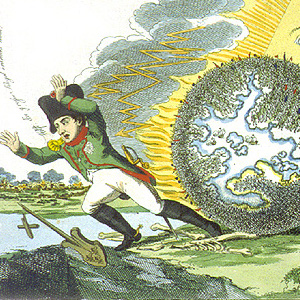Government

"This is My Dear Son": Napoleon as Child of the Devil
Linking Napoleon with Hell represents a far cry from his own propaganda. German propaganda piece depicting Napoleon as the child of the Devil.

"The Song of the End": The Whole World Now Chases Him
Where Napoleon was once the conqueror, the world now avenges itself. This sense of reversal, felt widely outside of France, characterized a number of the caricatures of Napoleon, and indeed of the entire Revolution.

The Little Cartesian Devil
The reversal of circumstances that German cartoonists emphasized seemed generally to exercise considerable sway over this use of symbols. Here, Napoleon, who strode so large over Europe, is bottled and examined.

The Great Man
German cartoonists tried to reduce Napoleon down to size, in this case, the size of mice! Here the mice serve as courtiers.

The Great Heroism of the Nineteenth Century
As in other caricatures, foreigners tried to humiliate Napoleon, once again using mice to represent those who would now attend him.

The Exorcism: Ridding France of the Devil Napoleon
The seal in the foreground, with its fleur–de–lys, indicates a return to royalism after France’s liberation from Napoleon. In addition, the secularism associated with the Revolution is countered with the image’s reference to the religious practice of exorcism.

His Monument: Napoleon's Past and Future Are FIlled With Dead Bodies
This Janus–like figuration of Napoleon haunts the viewer as it suggests a future filled with skulls. Indeed, the unprecedented deaths from war and conquest of the last two centuries make this image seem predictive.

Celebrating Napoleon's Birthday on the Island of St. Helena
In this cartoon, Napoleon is portrayed as a buffoon, riding a goat in a charge against rodents, mocking his warlike instincts.

Isn't she a little young?
This billboard was erected across the American state of Virginia in the summer of 2004 as part of a state health department campaign aimed at reducing statutory rape (the crime of sex with an underage girl).

Beatles Petition and Response
In April 1964, the U.S. Labor Department announced new rules for foreign entertainers. Applying through Immigration and Naturalization Service (INS), entertainers with unique talent would be allowed to enter.